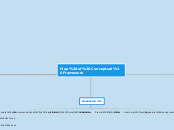Map of Creative Framework

Map of Conceptual Framework
Other Components
Online Delivery
Non-traditional student can continue their education
Removes instructor bias
Content delivery method of courses have little effect of student outcomes
Technology
Adopt, Adapt and Implement technology to improve student learning
Diversity
5 KTS Proficiencies that align with ISLLC Standards and KCS Standards
Assessments
Signature Assessment
Advisory Meeting
GPA
Praxis II Exams
E-Portfolio
Field / Clinical Experience
Recommendations / Dispositions
Communicative
Communicate knowledge to others
Evaluative
Develop & implementing assessments
Strategic
Intentional actions selected to achieve specific goals
Conceptual
Individual knowledge of concepts and ideas
Standards & Dispositions
Critical Thinking
Higher-order thinking
Quality Learning Experiences
Classroom Creativity
Knowledge Bases
Reflective: research best-practices | Constructivism: teacher is facilitator more than deliverer of information
Dispositions
1. Caring 2. Strong Work Ethic 3. Critical & Creative Thinking 4. Commitment to Excellence and Professional Integrity
Key Teacher Dispositions
Possess attitudes and beliefs that distinguish them from less effective teachers.
History
Continuous Checkpoints
Four Knowledge Strands
1. Conceptual 2. Strategic 3. Evaluative 4. Communicative
Theme
"Reflective constructors of quality learning experiences"
The Philosophy of the Learner
Constructs knowledge based on personal experience, beliefs and pre-existing mental structures

